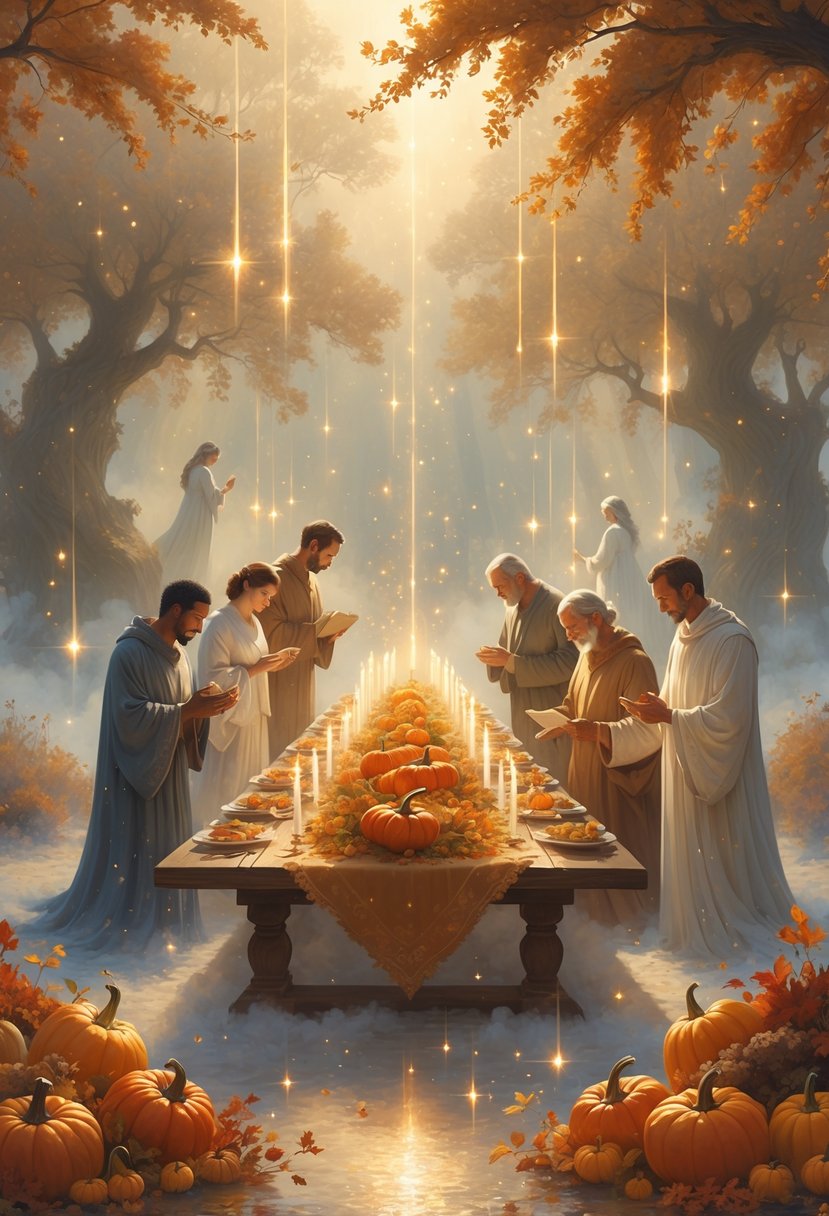Celebrate Thanksgiving with Faith-Focused Traditions

Faith-centered traditions can turn Thanksgiving into a meaningful worship experience. When you add biblical verses, heartfelt prayers, and intentional dinner conversations, you open up space to recognize God’s blessings all year long.
Sharing Thanksgiving Bible Verses
Reading Scripture together brings spiritual depth to your Thanksgiving gathering. A Thanksgiving Bible study can draw families closer through God’s Word.
Psalm 107:1 says, “Give thanks to the Lord, for he is good; his love endures forever.” That verse alone can set the tone for your celebration.
Key Thanksgiving Verses:
- 1 Thessalonians 5:18 – “Give thanks in all circumstances”
- Colossians 3:17 – “Do everything in the name of the Lord Jesus, giving thanks”
- Ephesians 5:20 – “Always giving thanks to God the Father for everything”
Print out verse cards and place one at each setting. Let everyone take turns reading their verse aloud before the meal begins.
You might want to focus on Psalm 107, which repeats the call to give thanks to the Lord. Its four sections highlight God’s deliverance and faithfulness in different situations.
Prayers Centered on Gratitude
Taking time for intentional prayer can turn Thanksgiving dinner into a true act of worship. Slow down and create space for meaningful moments of gratitude, not just a quick blessing before the meal.
Prayer Circle Format:
- Start by thanking God for salvation (here’s a guide)
- Share specific blessings from the past year
- Pray for family members by name
- Thank God for provision and protection
- Close with praise for His faithfulness
Try hosting a gratitude prayer circle where everyone shares what they’re thankful for. This simple practice builds connection and acknowledges God’s abundance.
If anyone feels nervous about praying out loud, write out some prayers ahead of time. Invite kids to join in by praying for things like food, family, or even their pets—it doesn’t have to be fancy.
Faith-Filled Thanksgiving Dinner Conversations
Intentional conversation can make your dinner table feel like sacred space. Swap the usual small talk for discussions that honor God and deepen your relationships.
Conversation Starters:
- “How did God show His faithfulness this year?”
- “What answered prayer are you most grateful for?”
- “Which Bible story reminds you of thanksgiving?”
- “How has your faith grown recently?”
Share stories of times when God provided during hard moments. Talk about how giving thanks can shift your outlook on both challenges and blessings.
Encourage guests to connect their gratitude to specific ways they’ve seen God at work. It’s a small shift, but it can turn general thankfulness into real worship that recognizes His presence.
Creative Bible-Based Thanksgiving Activities

Hands-on activities that blend art and Scripture can really deepen your gratitude practice. You can make meaningful decorations while reflecting on God’s faithfulness, or engage with Bible verses through interactive games.
Thanksgiving Scripture Art and Crafts
Turn your favorite gratitude verses into simple home decorations using whatever art supplies you have. Pick passages like Psalm 107:1 or 1 Thessalonians 5:18 for your projects.
Try making calligraphy wall art by writing verses on canvas or wood in your own handwriting. Add autumn leaves, gold accents, or watercolor backgrounds if you feel like getting fancy.
Create a Scripture wreath by tying small cards with thanksgiving verses to a grapevine wreath. Jot down a personal blessing next to each verse. It’s both decoration and a daily reminder of God’s goodness.
Start a gratitude journal with a decorated cover featuring your favorite thanksgiving scripture. Use it throughout November to record daily blessings and prayers of thanks.
Bible Verse Word Search and Games
Design a custom word search with thanksgiving-themed Bible verses and words like “praise,” “blessing,” and “harvest.” Pull in terms from Psalm 107 too, like “steadfast love.”
Make Bible verse puzzles by writing out verses on cardstock, cutting them up, and piecing them back together as a group. Discuss what each verse means after you solve it.
Play gratitude charades and act out biblical characters who showed thankfulness—maybe David writing psalms or the leper who came back to thank Jesus.
Host a thanksgiving trivia game with questions about biblical gratitude and harvest celebrations. Toss in some Old Testament festival facts or New Testament teachings on thankfulness for good measure.
Reflective Practices for Giving Thanks

Writing down what you’re grateful for and meditating on Scripture focused on God’s faithfulness can create powerful moments of spiritual connection. These little pauses help you step away from daily routines and really notice God’s provision in your life.
Personal Journaling on Gratitude
Try setting aside 10 or 15 minutes in the morning to jot down three specific things you’re grateful for from the day before. Get detailed—skip the generic stuff.
Instead of “I’m grateful for my family,” maybe write, “I’m grateful for my daughter’s laughter during our evening walk.” That kind of specificity helps you see God’s daily gifts more clearly.
On days when you’re drawing a blank, use prompts like, “What challenged me yesterday, and how did God provide strength?” or “Which conversation brought me joy this week?”
Weekly Reflection Technique:
- Monday: Relationships that blessed you
- Tuesday: Answered prayers, big or small
- Wednesday: Moments of peace or comfort
- Thursday: Opportunities for growth
- Friday: Simple pleasures you enjoyed
Keep your journal somewhere visible, like next to your bed or coffee pot, so you remember to use it. Writing letters of thanks to God can help you start a personal conversation with Him and spot His presence in ordinary moments.
Meditative Readings of Psalm 107
Psalm 107 keeps coming back to “Give thanks to the Lord, for he is good; his love endures forever.” Read it slowly, pausing after each verse to let the words sink in.
The psalm tells about four groups of people who called out to God in distress. Notice how God rescued each group, and how they responded with thanksgiving.
Pick one verse that really hits home for you right now. Write it on a card and carry it with you during the day.
Meditation Structure:
- Read Psalm 107:1-3 out loud twice
- Sit quietly for two minutes
- Read verses 4-9, reflecting on times God guided you
- Keep going through the chapter in sections
- Finish by repeating verse 1 as your own declaration
Pay extra attention to verse 21: “Let them give thanks to the Lord for his unfailing love and his wonderful deeds for mankind.” Think about how that fits into your own story of God’s faithfulness.
Try this Thanksgiving meditation regularly—it’s a gentle way to grow a heart that naturally sees God’s goodness, both in struggles and in celebrations.
Community Outreach and Acts of Service

Thanksgiving feels more meaningful when you let gratitude overflow into serving others. When you create giving opportunities and volunteer your time, you turn personal thankfulness into a blessing for your whole community.
Organizing a Thanksgiving Offering
First, find out what your local food banks, shelters, or community centers need most. You can organize food drives and blessing baskets that connect families in need with donors.
Essential Items to Collect:
- Non-perishable foods (canned veggies, stuffing mix, cranberry sauce)
- Fresh ingredients (turkey, potatoes, bread)
- Personal care items
- Gift cards for groceries
Put together blessing bags with snacks, toiletries, and a note of encouragement. Add a personal message about how you’re thankful for the chance to help.
Team up with local organizations to make a bigger impact. Churches, schools, and community groups working together can reach more families than you’d expect.
Set up collection points where people already go. Make it easy for contributors by giving out clear lists and specific drop-off times.
Volunteering to Prepare or Serve a Thanksgiving Meal
Community kitchens and shelters always need extra hands during Thanksgiving week. Reach out to local organizations early—volunteer spots can fill up fast.
Volunteer Roles Available:
- Food preparation: Chopping veggies, prepping sides, cooking
- Serving: Greeting guests, plating meals, clearing tables
- Setup/cleanup: Arranging dining areas, washing dishes
- Hospitality: Welcoming guests, starting conversations
Many community service projects during the holidays focus on serving meals to people facing homelessness or food insecurity.
Show up with a spirit of giving thanks through action. Engage warmly with guests—sometimes your presence means more than the food itself.
Bring your family or friends along to volunteer together. You’ll create shared memories of gratitude and show each other the value of serving others.
Hosting Faith-Inspired Group Activities

Prayer circles offer intimate spaces for sharing gratitude. Reader’s theater brings biblical stories of thanksgiving to life through collaborative storytelling.
Thanksgiving Prayer Circle
Prayer circles unite adults in giving thanks together. Arrange chairs in a circle for a cozy, connected feel.
Start by inviting everyone to share one blessing from the past year. This simple step really opens hearts and minds to God’s goodness.
Prayer Circle Structure:
- Opening prayer – The leader begins with gratitude to God.
- Personal sharing – Each person mentions a specific blessing.
- Group prayer – Everyone prays at once, focusing on thanksgiving.
- Closing blessing – The leader offers final words of thanks.
Encourage people to speak from the heart. If someone’s nervous about praying aloud, let them know a simple “thank you, God” is more than enough.
Try weaving in thanksgiving-themed Bible verses like Psalm 100 or 1 Thessalonians 5:18. These scriptures bring a spiritual foundation to the gathering.
The circle setup helps keep one person from dominating, and it opens up space for quieter folks to share what they’re grateful for.
Reader’s Theater: Stories of Giving Thanks
Reader’s theater turns biblical thanksgiving stories into lively group experiences. Assign roles to participants who read Scripture passages about gratitude and God’s provision.
Pick stories that spotlight thanksgiving themes from the Bible. The ten lepers in Luke 17:11-19 is a classic—ten readers, a narrator, and Jesus.
Popular Reader’s Theater Scripts:
- David’s psalm of thanksgiving (2 Samuel 22)
- Hannah’s prayer of gratitude (1 Samuel 2:1-10)
- The woman who anointed Jesus (Luke 7:36-50)
- Paul’s thanksgiving prayers (Ephesians 1:15-23)
No need for costumes or memorization. Simple printed scripts let everyone jump in, even if they’ve never acted before.
Assign roles based on comfort level. Some folks like narrating, others love character voices. If you want, let several people share the same role.
This activity fits perfectly for thanksgiving church services since it gets everyone involved. The group reading builds community while exploring stories of biblical gratitude.
Meaningful Thanksgiving Dinner Experiences

Turn your thanksgiving dinner into a sacred time of connection and worship. These practices help families pause during the meal to give thanks and create memories that stick.
Sharing Thankful Memories
Make space at dinner for everyone to share a specific moment from the past year when they experienced God’s faithfulness. Ask for stories, not just a list of blessings.
Go first and share your own thankful memory to set the tone. Encourage details—how did God show up during a tough time or surprise you with a gift?
Memory-sharing prompts to guide conversation:
- A time when prayer was answered in an unexpected way
- A moment when you felt God’s presence during difficulty
- An instance where someone showed you Christ’s love
- A blessing that came from what seemed like a setback
Keep a gratitude journal at the table so family can jot down the memories. It’s surprisingly meaningful to read these stories again next year.
Young adults especially appreciate when you ask about their growth or relationships. Listen fully when each person speaks.
Thanksgiving Communion at the Table
Try a simple communion service during your thanksgiving dinner using bread and wine from your meal. This connects your family feast to Christ’s sacrifice and God’s provision.
Read 1 Corinthians 11:23-26 aloud, then break bread together. Focus on how Jesus gave thanks, even on the night he was betrayed.
Don’t stress about formal communion elements. Dinner rolls and grape juice (or wine) work just fine. The heart of it is gratitude and remembrance, not perfect ceremony.
Simple communion structure:
- Read the scripture passage
- Pray over the bread, giving thanks for Christ’s body
- Share bread with each person
- Pray over the cup, thanking God for Jesus’ sacrifice
- Share the cup around the table
This practice can help your family remember that every meal is a gift from God. It transforms an ordinary thanksgiving dinner into holy ground where you all give thanks for salvation.
Encouraging Connection and Gratitude Beyond the Table

Thanksgiving doesn’t stop at the dinner table. Meaningful acts of giving thanks and sharing blessings with those who need encouragement help you connect with your community while expressing genuine gratitude.
Blessing Others with Thanksgiving Cards
Create personalized Thanksgiving gratitude cards for people who’ve impacted your life. Write a specific thank you to pastors, teachers, neighbors, or family members for their kindness this year.
Add a Bible verse about giving thanks, like 1 Thessalonians 5:18 or Psalm 107:1. Mention how their actions blessed you or your family in a real way.
Card Recipients to Consider:
- Church leaders and volunteers
- Healthcare workers
- Mail carriers and service workers
- Elderly neighbors or relatives
- Teachers and mentors
If you can, hand-deliver the cards to make it personal. This simple gesture turns gratitude into encouragement that others can actually feel.
Extending Invitations to Those in Need
Why not open your Thanksgiving celebration to folks who might otherwise spend the holiday alone? You could reach out to international students, military families, elderly church members, or new faces in your community.
Try contacting local churches, community centers, or even military bases to find families who’d really appreciate an invitation. Holidays can feel especially isolating for many, so your gesture might mean more than you realize.
Ways to Extend Hospitality:
- Invite college students who are far from home
- Include single parents or widowed neighbors
- Welcome newcomers to your area
- Offer a ride to anyone who doesn’t have transportation
Make a little extra food and aim for a warm, welcoming vibe that shows Christ’s love—sometimes that’s the heart of Thanksgiving, isn’t it?
Follow us on Social Media!
I’m Nina, and I’m very passionate about spirituality. Exploring the depths of the soul and connecting with the divine has always been my source of inspiration. Join me on a journey of self-discovery and inner peace through my writing.
